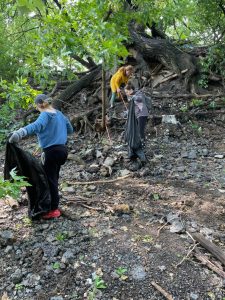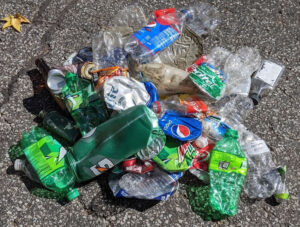Since the city I live in (Covington, KY) borders the Ohio River, last weekend I participated in an annual “River Sweep.” The goal is to clean up trash along the wooded banks of the Kentucky side of the river. I met with about 30 other diligent environmental do-gooders armed with old jeans, hearty shoes, gloves, and “tricky sticks” to pick up litter and put it into large plastic bags without having to personally touch most of it. I felt virtuous cleaning up my side of the river.
Invisible People:
 But, soon I was impacted by a deeper part of this experience – How did all this litter get here? It wasn’t spontaneously generated. Human beings left cans, bottles, and paper strewn on the ground. After a moment of judgementalism about litterbugs (after all I had made many “Don’t be a litterbug” posters as a child), I realized that the litterers were not just lazy, they were destitute and desperate. I started also finding blankets, old sweatshirts, shoes, and sleeping pads on the ground. Most of these articles were mired in mud and heavy to pull out and put in our plastic bags. Hmmm. Homeless people had obviously been sleeping here and they weren’t camping for fun. They were invisible to me now, but remnants of them remained. Where did they go? Did they find a homeless shelter, a job, a way out of poverty?
But, soon I was impacted by a deeper part of this experience – How did all this litter get here? It wasn’t spontaneously generated. Human beings left cans, bottles, and paper strewn on the ground. After a moment of judgementalism about litterbugs (after all I had made many “Don’t be a litterbug” posters as a child), I realized that the litterers were not just lazy, they were destitute and desperate. I started also finding blankets, old sweatshirts, shoes, and sleeping pads on the ground. Most of these articles were mired in mud and heavy to pull out and put in our plastic bags. Hmmm. Homeless people had obviously been sleeping here and they weren’t camping for fun. They were invisible to me now, but remnants of them remained. Where did they go? Did they find a homeless shelter, a job, a way out of poverty?
Recycling:
 This reminds me of another environmental clean-up my husband and I often do during our winter walks around the neighborhood. On a less disturbing scale, we often find empty cans and plastic bottles along the street and carry a bag to pick them up for recycling. Good for us, but…I also have been in the recycling field long enough to know that usually less than 9% of recyclable cans and bottles actually get recycled.
This reminds me of another environmental clean-up my husband and I often do during our winter walks around the neighborhood. On a less disturbing scale, we often find empty cans and plastic bottles along the street and carry a bag to pick them up for recycling. Good for us, but…I also have been in the recycling field long enough to know that usually less than 9% of recyclable cans and bottles actually get recycled.
I console myself with saying that at least we’re cleaning up the neighborhood streets even if only a smidgen of it actually gets recycled.
So…are River Sweeps and recycling in general just temporary solutions? They are good. They are necessary. But perhaps their ultimate function is to point humanity (us) to the bigger, endemic problems – we create too much trash, and we trash people. I am not the first to recognize this and the solutions are not new:
- Reduce the need for recycling by reducing the production of plastic (especially single use plastic containers). After all, even the production of plastic by fracking and cracker plants harm the environment.
- Address homelessness and poverty by increasing services to our fellow human beings who need training for jobs, counseling for mental/emotional disabilities, etc., etc., etc.
 These are systemic changes that look at the source of the problems and often require political and organizational efforts. It’s hard. It can’t be done alone. It takes a community bolstered by faith, hope, and love. Which brings me back to individual actions. Which part of this mammoth systemic change am I called to do?
These are systemic changes that look at the source of the problems and often require political and organizational efforts. It’s hard. It can’t be done alone. It takes a community bolstered by faith, hope, and love. Which brings me back to individual actions. Which part of this mammoth systemic change am I called to do?
How do you resolve these epic challenges? Pick up more litter? Pick up another human being? Pick a cause? Spend your money? Spend your time? _______________________?
PS: Check out the disturbing 28 min. video, The Secret Life of Plastic Recycling.